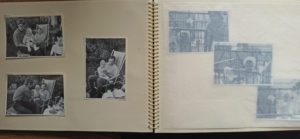Vortragende wie Moderator*innen der Tagung „Private Blicke in Diktatur und Demokratie: Schmalfilme und Fotos im 20. Jahrhundert“ haben der Redaktion von Visual History vorab ein Foto oder Filmstill aus der Forschungspraxis geschickt und dazu einige Sätze notiert: zum Bild selbst, zum Projekt, zum Vortrag auf der Tagung – so ist ein visuelles Mosaik zum Informieren, Stöbern und Entdecken entstanden.
Album Familie J., 1974, privat ©
Frank Bösch (Potsdam), „Private Medien als Quellen der Zeitgeschichte“
Private Fotos und Schmalfilme gelten als banale Quelle, die die Forschung bisher kaum systematisch analysierte. Wie bei diesem Foto-Album aus der DDR von 1974 erscheint unerheblich, ob die Bilder in Diktatur oder Demokratie entstanden oder ob sie aus den 1930er oder 1980er Jahren stammen. Denn meist bilden sie Familien oder Freunde in glücklichen Momenten ab. Der Einführungsvortrag schlägt Wege vor, um sie als wichtige Quelle für die allgemeine Zeitgeschichte zu erschließen: etwa als Praktiken, die Biografien, Familien und soziale Beziehungen konstruieren; als Entwürfe zukünftiger Erinnerungen, die sich dann wieder über die Aufnahmen neu konstituieren; oder auch als Zugang zu einer Geschlechter-, Generationen- und Emotionsgeschichte.
[...]
Quelle: https://visual-history.de/2020/12/08/private-blicke/?utm_source=rss&utm_medium=rss&utm_campaign=private-blicke
